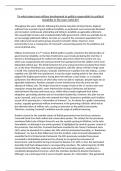Carmen
To what extent was military involvement in politics responsible for political
instability in the years 1646-60?
Throughout the years 1646-60, following the pivotal execution of King Charles, England
suffered from a period of great political instability, as parliament was numerously dissolved
and recreated, continuously attempting and failing to establish an agreeable settlement.
This caused high tensions and a fundamentally futile government, which was partially due to
an increasingly politicised military, but also as a result of the consistent opposition from
both radical and conservative groups towards Cromwell’s ideals. However, more
prominently it was a consequence of Cromwell’s unwavering passion for his ambitious and
unconventional aims.
Military involvement in 17th Century British politics is partly at fault for the deterioration of
governmental reliability. As the New Model Army was introduced during the Civil War, it
became a breeding ground for radical new ideas about how which the country was run,
which was exasperated by the announcement from parliament that the soldiers were to be
disbanded without pay. The divide between the army and government escalated from there
on, as the Army Manifesto was created and ignored, until the climax of Pride’s Purge came
in 1648. This marked the primary, dramatic interference in politics from the military, as they
expelled over 200 MPs from parliament. It was the major starting point for the chaos that
plagued the English government, having been left without a clear leader, or a complete
parliament: the effectiveness of which they were not able to replicate, despite hopes for an
agreeable settlement. Another example of overt interference from the army was the
attempt of military rule. The Major Generals in charge of each of the 11 sectors were very
unpopular among the public: some enforced the closing of alehouses and banned
entertainment like plays and horse races, whilst others simply neglected their duties
altogether, generating calamity and an inconsistent leadership. However, this plan was set
up by Cromwell, and it was him who ordered the Major Generals to prohibit such frivolities
as part of his yearning for a ‘reformation of manners’. So, his desire for a godly, harmonious
society, arguably galvanized military involvement in the governing of Britain, which led to
the ultimate failure of military rule, causing an extension to the political uncertainty.
Therefore, meaning Cromwell’s ambition was the origin of political wavering.
Another reason for the unstable nature of British government was the fierce resistance
Cromwell faced from both radical and conservative parties. The catalyst for the previously
mentioned failed rule of Major General’s was the royalist uprising in Wiltshire, led by John
Penruddock, as although it was easily quashed, it highlighted the need for greater control of
the provinces. Not only this, Cromwell had been resented by the ‘Rump’ Parliament since
1653, when he dissolved it to replace the MPs with the Nominated Assembly, or ‘Barebones
Parliament’. So, due to their bitterness from this incident, when Cromwell attempted to
assemble the First Protectorate Parliament, the MPs previously excluded from power
succeeded in destabilizing parliament by refusing to recognize the Instrument of
Government, and therefore forcing Cromwell to dissolve it in 1655. In fact, the Nominated
Assembly itself had collapsed due to uncooperating members. The radical minority of Fifth
Monarchists felt that they could not work with the conservative gentry, resulting in a
completely disorganized structure, which the members decided to dissolve themselves.
Although, one could argue that it was Cromwell’s passion for ‘reformation’ that galvanized




